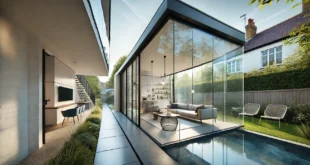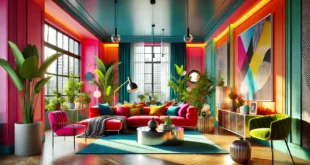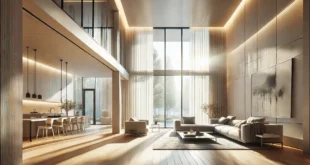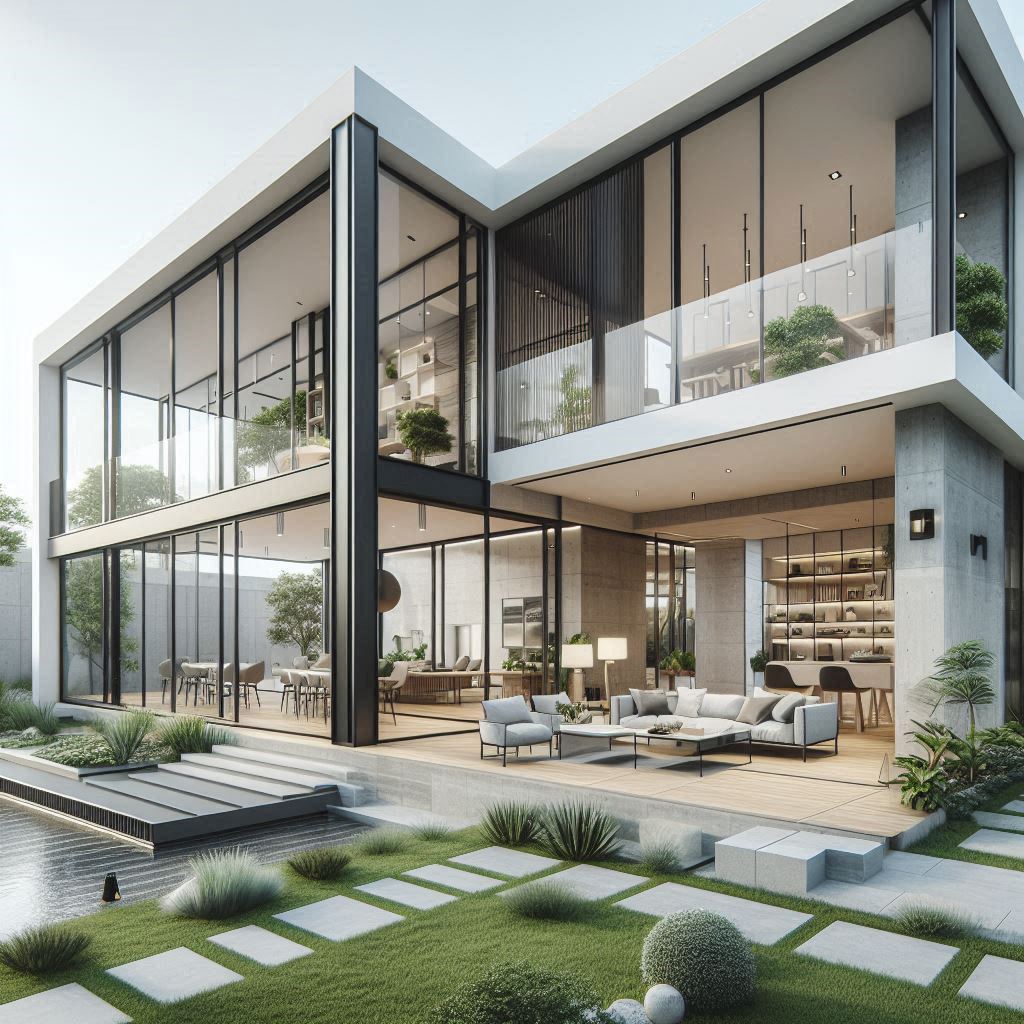 Welcome to the world of modern home design, where innovation meets elegance, and functionality blends seamlessly with aesthetics. Whether you are planning a complete home overhaul or seeking to upgrade certain areas, this article will guide you through the intricacies of modern home design with ease and expertise. In today’s fast-paced world, modern home design has become synonymous with simplicity, sophistication, and sustainability, providing homeowners with a living space that is both stylish and practical. By integrating contemporary materials, cutting-edge technology, and an emphasis on clean lines, modern home design offers a refreshing contrast to more traditional styles.
Welcome to the world of modern home design, where innovation meets elegance, and functionality blends seamlessly with aesthetics. Whether you are planning a complete home overhaul or seeking to upgrade certain areas, this article will guide you through the intricacies of modern home design with ease and expertise. In today’s fast-paced world, modern home design has become synonymous with simplicity, sophistication, and sustainability, providing homeowners with a living space that is both stylish and practical. By integrating contemporary materials, cutting-edge technology, and an emphasis on clean lines, modern home design offers a refreshing contrast to more traditional styles.
We understand that embarking on a modern home design project can be overwhelming, especially with the endless possibilities available today. That’s why we are here to help you make informed decisions, whether you’re focusing on a single room or an entire home. Our objective is to show you how modern home design can transform your space into a haven that reflects your personal style, while also enhancing the functionality of your daily life. As professional home designers, we will walk you through key elements, trends, and ideas to inspire and ignite your creativity. Let’s begin your journey into the exciting world of modern home design and make your dream space a reality.
Introduction to Modern Home Design
Understanding Modern Home Design
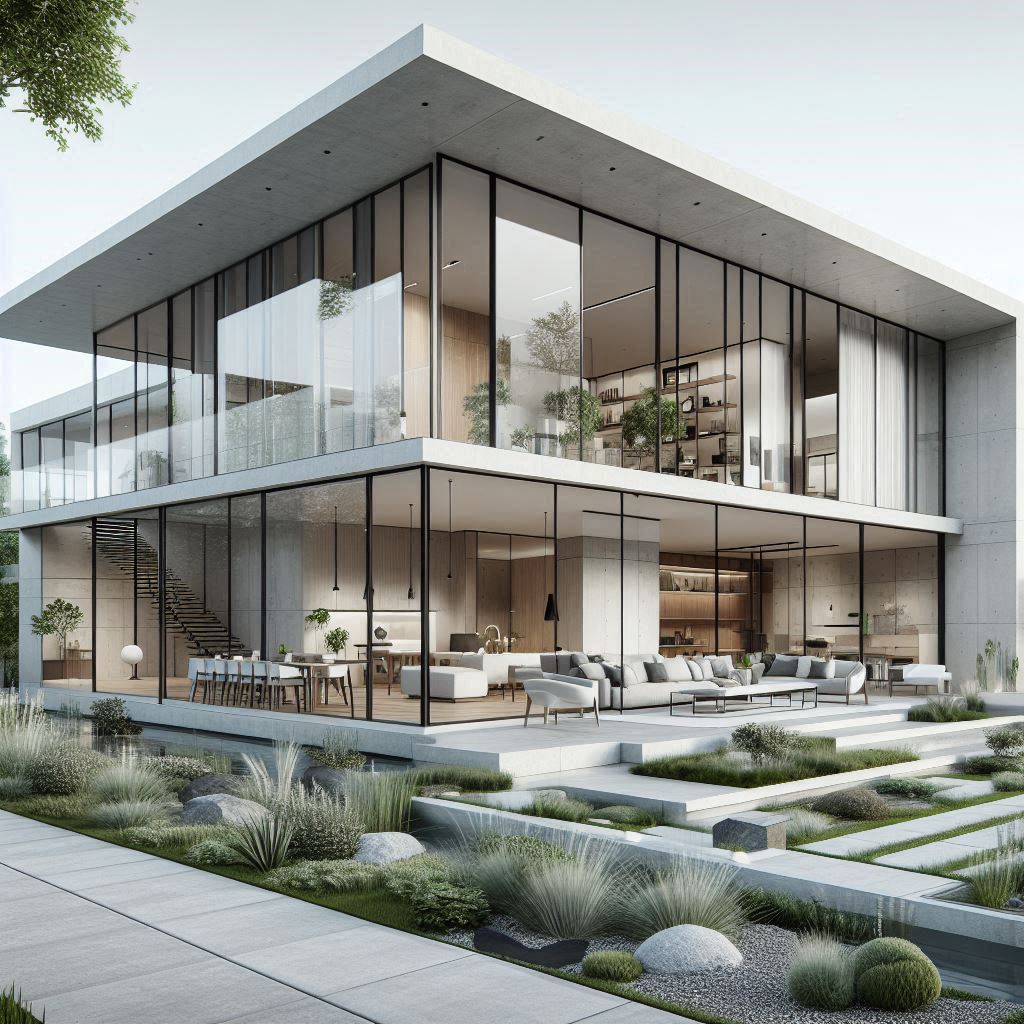 Modern home design is rooted in a design philosophy that emphasizes clean lines, open spaces, and a focus on function over ornamentation. It developed in the early 20th century, influenced by the industrial revolution, and it has since evolved to become one of the most popular architectural styles in the world. What makes modern home design so appealing is its ability to balance aesthetics with practicality. From sleek furniture to smart home technology, modern design creates a harmonious environment where every element serves a purpose.
Modern home design is rooted in a design philosophy that emphasizes clean lines, open spaces, and a focus on function over ornamentation. It developed in the early 20th century, influenced by the industrial revolution, and it has since evolved to become one of the most popular architectural styles in the world. What makes modern home design so appealing is its ability to balance aesthetics with practicality. From sleek furniture to smart home technology, modern design creates a harmonious environment where every element serves a purpose.
Evolution of Modern Home Design
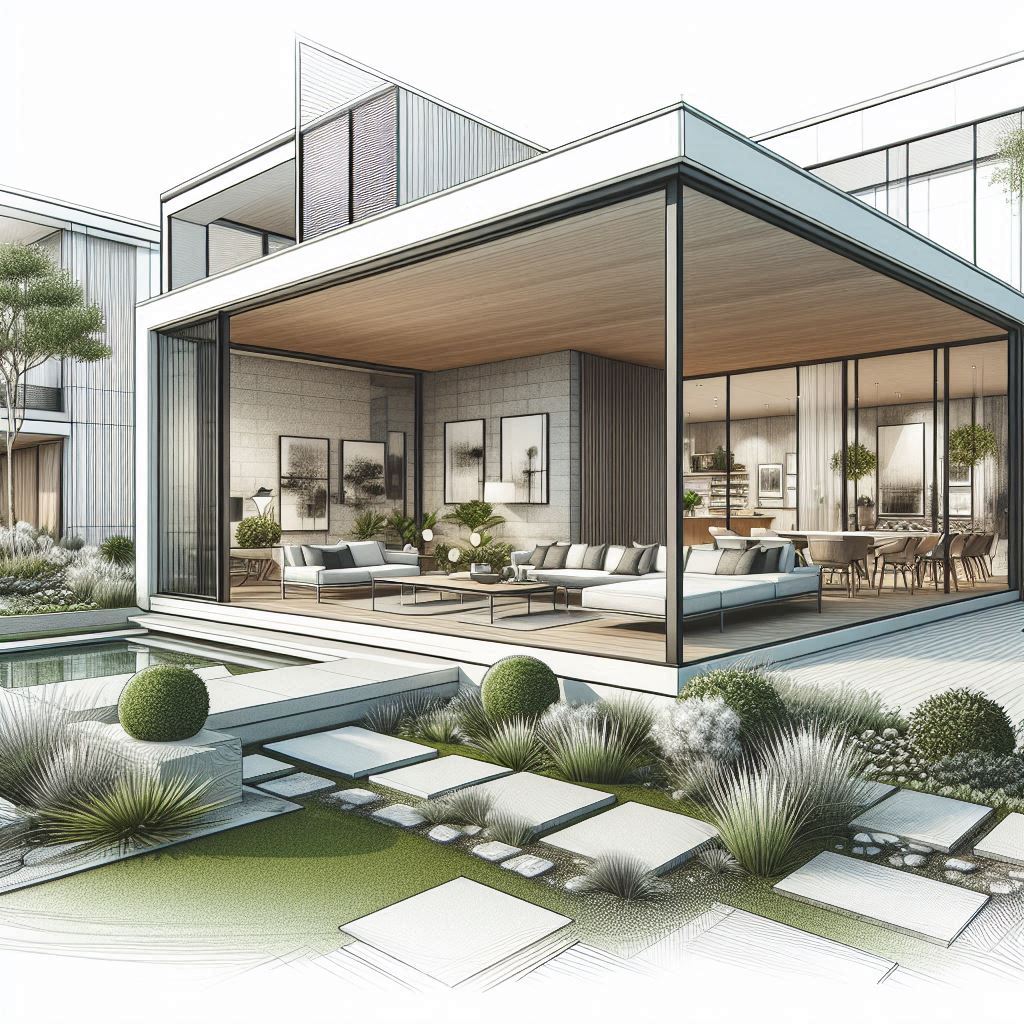 Modern home design has gone through various phases, from the minimalist aesthetics of the early modernist movement to today’s fusion of functionality and luxury. As we embrace more sustainable and eco-friendly practices, modern home design continues to evolve. The integration of energy-efficient appliances, eco-conscious materials, and smart home automation is central to the modern design ethos. Additionally, modern home design now prioritizes creating spaces that are adaptable to the needs of the homeowner, with multifunctional furniture and open layouts being particularly popular.
Modern home design has gone through various phases, from the minimalist aesthetics of the early modernist movement to today’s fusion of functionality and luxury. As we embrace more sustainable and eco-friendly practices, modern home design continues to evolve. The integration of energy-efficient appliances, eco-conscious materials, and smart home automation is central to the modern design ethos. Additionally, modern home design now prioritizes creating spaces that are adaptable to the needs of the homeowner, with multifunctional furniture and open layouts being particularly popular.
Characteristics of Modern Home Design
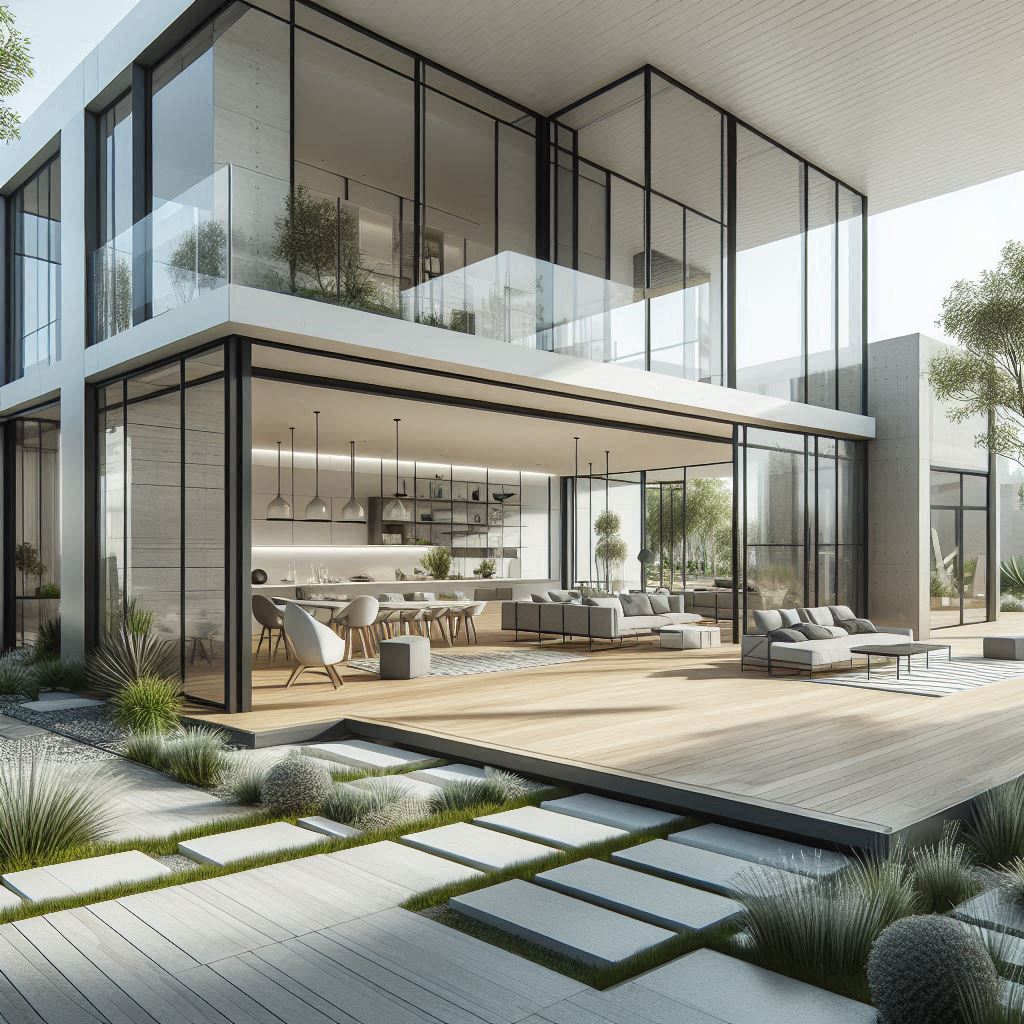 The key characteristics of modern home design include an open floor plan, large windows, and a focus on natural light. Modern homes are often characterized by a neutral color palette, with whites, blacks, grays, and earthy tones being predominant. Materials like glass, steel, and concrete are commonly used in modern homes, contributing to their clean and uncluttered appearance. Additionally, modern home design typically features sleek, unadorned furniture, minimal decorative elements, and an emphasis on geometric shapes and forms.
The key characteristics of modern home design include an open floor plan, large windows, and a focus on natural light. Modern homes are often characterized by a neutral color palette, with whites, blacks, grays, and earthy tones being predominant. Materials like glass, steel, and concrete are commonly used in modern homes, contributing to their clean and uncluttered appearance. Additionally, modern home design typically features sleek, unadorned furniture, minimal decorative elements, and an emphasis on geometric shapes and forms.
Why Modern Home Design is Popular
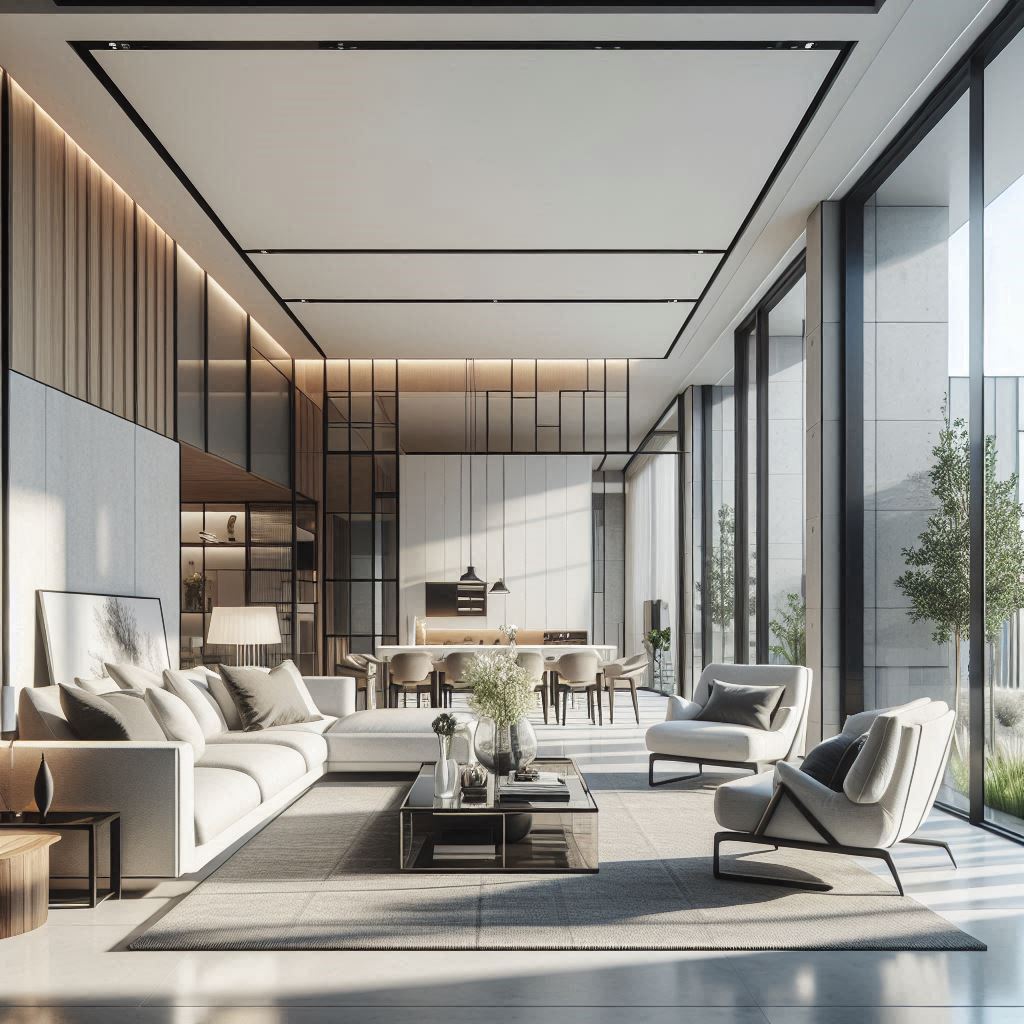 The popularity of modern home design can be attributed to its adaptability and its ability to create a sense of calm and order. Modern homes are known for their open spaces and uncluttered appearance, which makes them feel spacious and serene. This style of design is also incredibly versatile, allowing homeowners to easily incorporate personal touches and customization. Moreover, modern home design is aligned with current trends in sustainability and energy efficiency, which are increasingly important to homeowners.
The popularity of modern home design can be attributed to its adaptability and its ability to create a sense of calm and order. Modern homes are known for their open spaces and uncluttered appearance, which makes them feel spacious and serene. This style of design is also incredibly versatile, allowing homeowners to easily incorporate personal touches and customization. Moreover, modern home design is aligned with current trends in sustainability and energy efficiency, which are increasingly important to homeowners.
Incorporating Technology into Modern Home Design
One of the hallmarks of modern home design is the seamless integration of technology. From smart thermostats and lighting systems to home automation and security, modern homes are designed to make life easier and more efficient. The use of technology extends to the design itself, with computer-aided design (CAD) tools being used to create precise layouts and to experiment with different materials and color schemes. In addition, the growing popularity of smart home devices means that modern homes are equipped with cutting-edge technology that enhances convenience and comfort.
Modern Home Design vs. Traditional Design
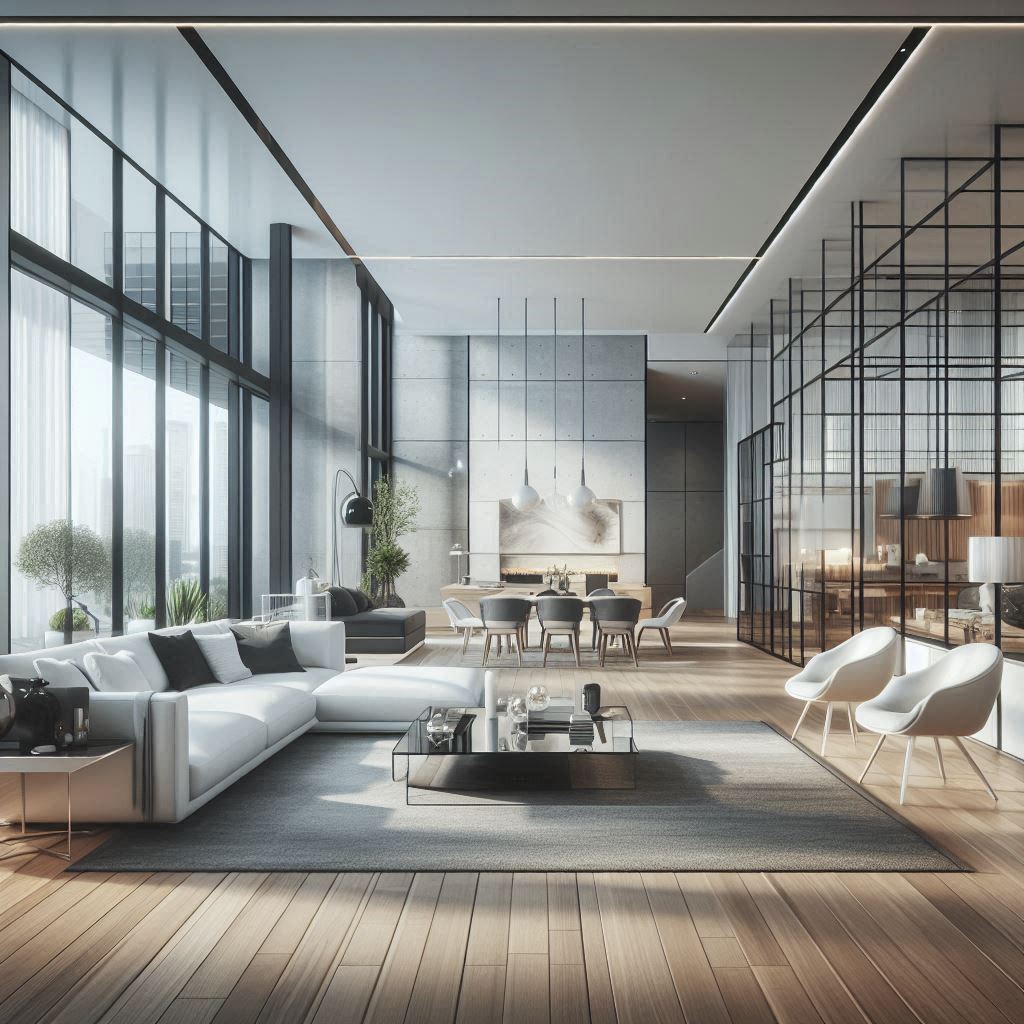 While modern home design is focused on clean lines and minimalism, traditional home design often features intricate details and ornamentation. In contrast to the open floor plans of modern homes, traditional homes tend to have more defined, separate spaces. Traditional design also typically uses warmer colors and more textured materials, such as wood and stone. Both styles have their advantages, but modern home design is often preferred for its sleek and streamlined look, which many find to be more in tune with contemporary lifestyles.
While modern home design is focused on clean lines and minimalism, traditional home design often features intricate details and ornamentation. In contrast to the open floor plans of modern homes, traditional homes tend to have more defined, separate spaces. Traditional design also typically uses warmer colors and more textured materials, such as wood and stone. Both styles have their advantages, but modern home design is often preferred for its sleek and streamlined look, which many find to be more in tune with contemporary lifestyles.
Personalizing Modern Home Design
Although modern home design is often associated with a minimalist aesthetic, it’s entirely possible to personalize a modern home to reflect your unique style. One of the most exciting aspects of modern design is its flexibility. By incorporating artwork, furniture, and color schemes that resonate with your personal taste, you can create a modern home that feels warm and inviting. Personalization can also be achieved through the thoughtful selection of materials, lighting fixtures, and even smart home features, ensuring that your modern home is not just a reflection of current design trends but also of your individuality.
The Core Elements of Modern Home Design
Open Floor Plans
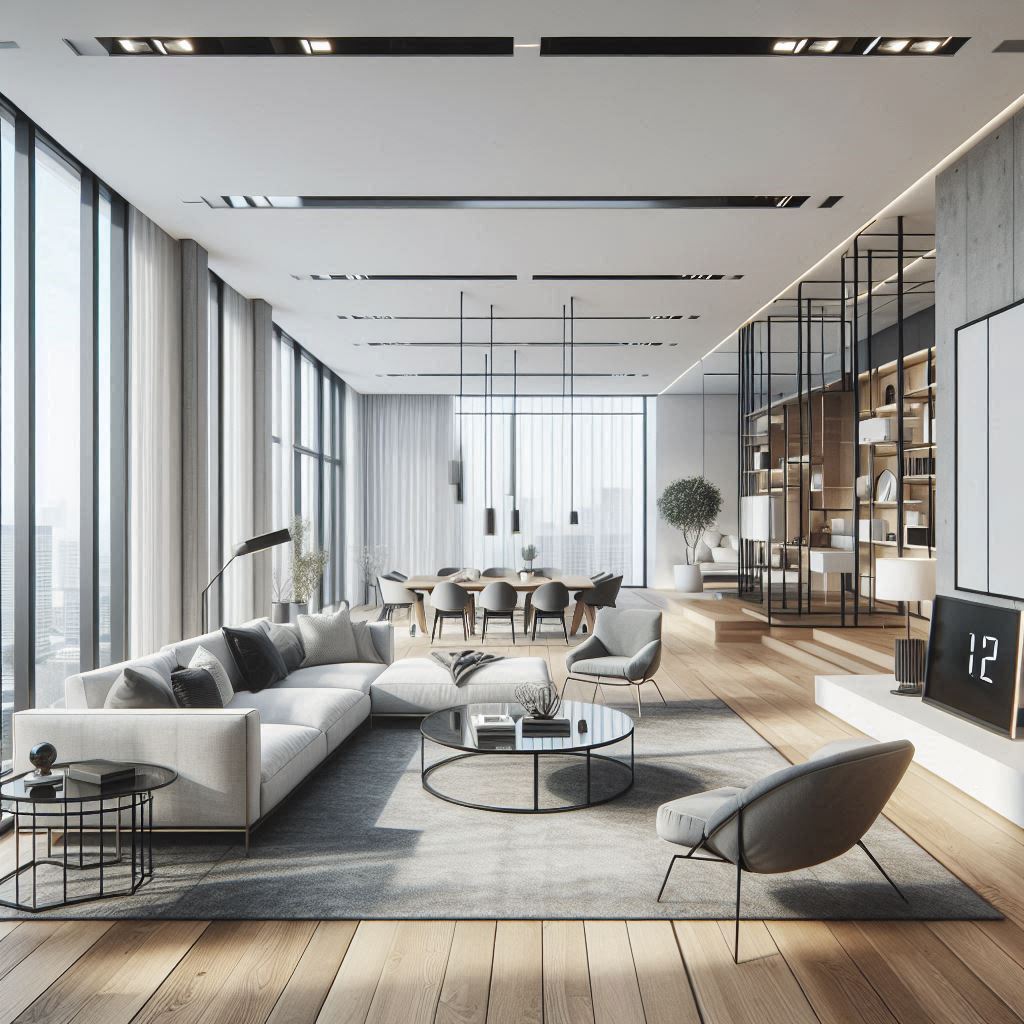 One of the defining features of modern home design is the open floor plan. In a modern home, spaces such as the kitchen, dining area, and living room flow together without the constraints of walls and doors. This creates a sense of openness and flexibility, making the home feel larger and more connected. Open floor plans also allow for greater flexibility in how spaces are used. For example, a dining area can easily be transformed into a home office or an entertainment space, depending on the homeowner’s needs. The open layout also encourages social interaction and makes modern homes ideal for entertaining.
One of the defining features of modern home design is the open floor plan. In a modern home, spaces such as the kitchen, dining area, and living room flow together without the constraints of walls and doors. This creates a sense of openness and flexibility, making the home feel larger and more connected. Open floor plans also allow for greater flexibility in how spaces are used. For example, a dining area can easily be transformed into a home office or an entertainment space, depending on the homeowner’s needs. The open layout also encourages social interaction and makes modern homes ideal for entertaining.
Natural Light and Large Windows
Modern home design places a strong emphasis on natural light. Large windows, often extending from floor to ceiling, allow for an abundance of natural light to fill the space. This not only reduces the need for artificial lighting during the day but also creates a connection with the outdoors. In modern homes, windows are typically unadorned or feature simple treatments, allowing the architecture and the natural light to take center stage. Skylights and glass doors are also commonly used to bring in additional light, further enhancing the bright and airy feel of a modern home.
Minimalist Aesthetic
The minimalist aesthetic is at the heart of modern home design. In a modern home, less is more. The focus is on clean lines, simple forms, and a clutter-free environment. This minimalist approach creates a sense of order and tranquility, making modern homes feel like peaceful retreats from the outside world. In terms of furniture, modern homes often feature sleek, low-profile pieces with little to no ornamentation. Decorative elements are kept to a minimum, with artwork and accessories being carefully curated to complement the overall design.
Sustainable and Eco-Friendly Design
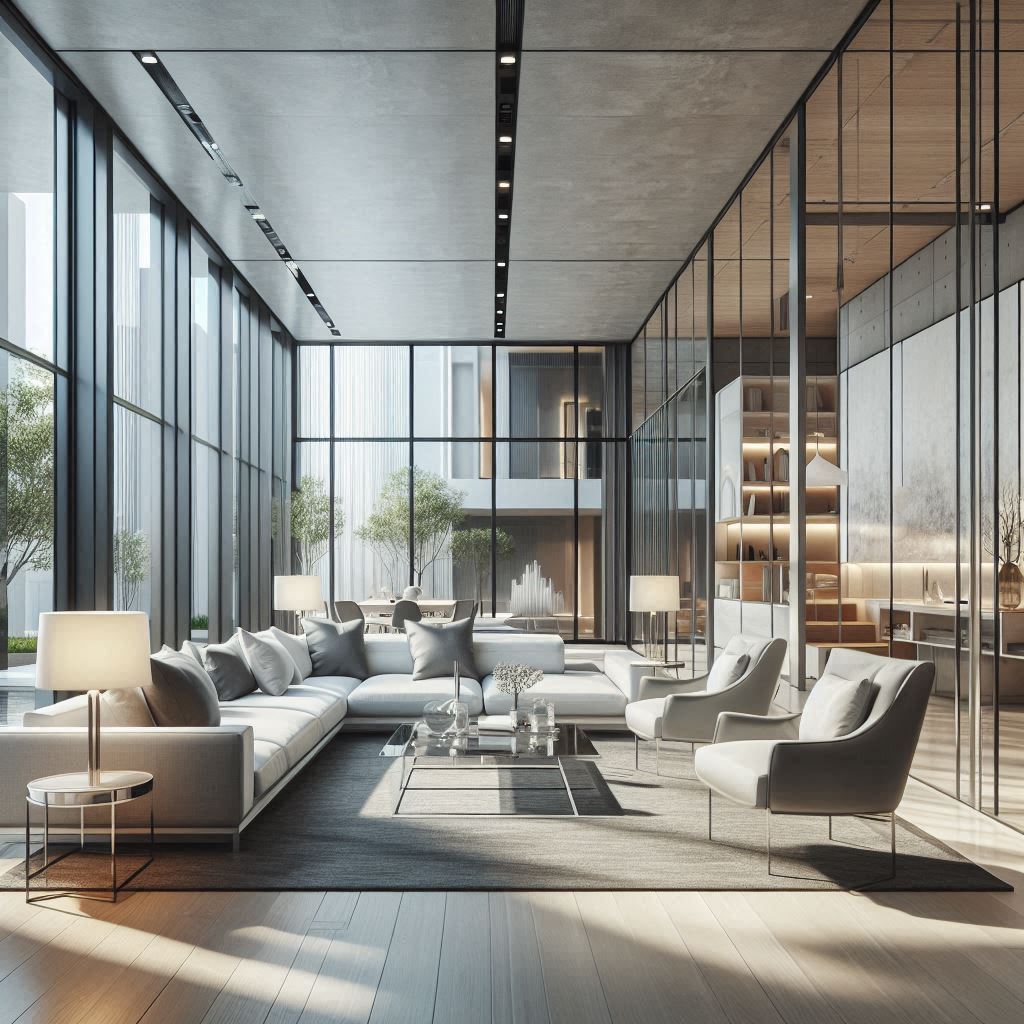 Sustainability is a key consideration in modern home design. From the materials used in construction to the appliances and systems installed in the home, modern design is all about reducing environmental impact. Eco-friendly materials such as bamboo, reclaimed wood, and recycled metal are often used in modern homes. Energy-efficient appliances, solar panels, and smart home systems that regulate energy usage are also common features in modern homes. Additionally, modern home design often includes features that promote water conservation, such as low-flow faucets and toilets, as well as sustainable landscaping practices.
Sustainability is a key consideration in modern home design. From the materials used in construction to the appliances and systems installed in the home, modern design is all about reducing environmental impact. Eco-friendly materials such as bamboo, reclaimed wood, and recycled metal are often used in modern homes. Energy-efficient appliances, solar panels, and smart home systems that regulate energy usage are also common features in modern homes. Additionally, modern home design often includes features that promote water conservation, such as low-flow faucets and toilets, as well as sustainable landscaping practices.
Functional Furniture
In modern home design, furniture is chosen not only for its aesthetic appeal but also for its functionality. Multifunctional furniture, such as sofas that convert into beds or coffee tables with built-in storage, is particularly popular in modern homes. This focus on functionality extends to every aspect of the home, from built-in storage solutions to modular furniture that can be easily rearranged to suit different needs. In a modern home, every piece of furniture serves a purpose, contributing to the overall sense of order and efficiency.
Neutral Color Palette
The color palette in modern home design is typically neutral, with shades of white, gray, and black being predominant. This neutral palette creates a calm and serene atmosphere, allowing the architecture and furnishings to take center stage. However, this does not mean that modern homes are devoid of color. Accent colors, such as bold blues, greens, or yellows, are often used sparingly to add interest and contrast. In some modern homes, natural materials such as wood and stone are used to bring warmth and texture to the neutral color scheme, creating a balanced and harmonious design.
Technology Integration
Technology plays a major role in modern home design. From smart home systems that control lighting, temperature, and security to high-tech appliances that make everyday tasks easier, modern homes are designed to incorporate the latest technology. Smart home devices, such as voice-controlled assistants and automated systems, are increasingly common in modern homes, providing homeowners with convenience and efficiency. Additionally, modern homes often feature advanced entertainment systems, home theaters, and integrated sound systems, making them ideal for those who enjoy entertaining or simply relaxing at home.
The Advantages of Modern Home Design
Energy Efficiency
One of the major advantages of modern home design is its emphasis on energy efficiency. Modern homes are designed to reduce energy consumption through the use of energy-efficient appliances, smart home systems, and sustainable building materials. This not only helps to reduce the home’s environmental impact but also results in significant cost savings for homeowners. Modern home designs often include features such as high-performance windows, insulation, and solar panels, which further enhance the home’s energy efficiency.
Flexibility in Design
Modern home design is incredibly versatile, allowing homeowners to customize their space to suit their personal preferences and lifestyle. Whether you prefer an open floor plan or more defined spaces, modern design can be adapted to meet your needs. The minimalist aesthetic of modern design also allows for easy updates and changes over time, making it simple to refresh the look of your home without major renovations. Additionally, the use of modular furniture and multifunctional spaces means that modern homes can easily accommodate changing needs, such as the addition of a home office or a growing family.
Maximizing Space
In modern home design, space is used efficiently and effectively. Open floor plans and multifunctional furniture allow modern homes to make the most of every square foot. Even in smaller homes, modern design can create the illusion of more space through the use of large windows, open layouts, and minimalistic furnishings. Additionally, modern homes often feature built-in storage solutions, such as custom cabinetry and hidden storage compartments, which help to keep the home organized and clutter-free.
Improved Functionality
Modern home design prioritizes functionality. Every aspect of the home is designed with the homeowner’s comfort and convenience in mind. From smart home technology that automates everyday tasks to multifunctional furniture that maximizes space, modern homes are designed to enhance the functionality of the space. This focus on functionality extends to every room in the house, from the kitchen and living areas to the bedrooms and bathrooms, ensuring that the home is not only beautiful but also practical and efficient.
Aesthetic Appeal
Modern home design is known for its sleek and sophisticated aesthetic. The clean lines, neutral color palette, and minimalistic approach create a sense of elegance and refinement. Modern homes are designed to be visually appealing without being overwhelming, allowing the architecture and furnishings to speak for themselves. The use of high-quality materials, such as glass, steel, and wood, further enhances the home’s aesthetic appeal. Additionally, modern home design allows homeowners to incorporate personal touches through artwork, furniture, and decorative elements, ensuring that the home reflects their unique style.
Low Maintenance
Another advantage of modern home design is its low maintenance requirements. The minimalist aesthetic of modern homes means that there are fewer decorative elements and less clutter to clean and maintain. Additionally, the use of durable materials, such as concrete, steel, and glass, ensures that modern homes are built to last. Smart home technology also makes it easier to maintain modern homes, with automated systems for heating, cooling, lighting, and security reducing the need for manual maintenance.
Eco-Friendly Living
Sustainability is at the core of modern home design. From the use of eco-friendly materials to energy-efficient appliances and systems, modern homes are designed to minimize their environmental impact. Many modern homes are built with sustainable materials, such as reclaimed wood and recycled metal, and feature energy-saving technologies, such as solar panels and smart thermostats. Additionally, modern home design often incorporates features that promote water conservation, such as low-flow fixtures and rainwater harvesting systems, making them a great choice for environmentally-conscious homeowners.
Frequently Asked Questions (FAQs)
What is the cost of modern home design?
The cost of modern home design can vary depending on the size of the home, the materials used, and the level of customization. While modern homes are often associated with luxury, they can also be designed to fit a wide range of budgets.
How long does it take to design a modern home?
The timeline for designing a modern home can vary depending on the complexity of the project. On average, it can take several months to a year to complete the design and construction process.
What materials are commonly used in modern home design?
Modern home design typically incorporates materials such as glass, steel, concrete, and wood. These materials are chosen for their durability, functionality, and aesthetic appeal.
Is modern home design suitable for families?
Yes, modern home design can be very family-friendly. The open floor plans and multifunctional spaces in modern homes make them ideal for families, providing plenty of room for activities and interaction.
Can I incorporate traditional elements into modern home design?
Absolutely! Many homeowners choose to blend modern and traditional elements to create a unique and personalized space. This is known as transitional design, and it combines the best of both styles.
How can I make my modern home more eco-friendly?
To make your modern home more eco-friendly, consider using sustainable materials, installing energy-efficient appliances, and incorporating smart home technology that reduces energy consumption. Additionally, features such as solar panels and rainwater harvesting systems can help make your home more environmentally-friendly.
What are the most important features of modern home design?
The most important features of modern home design include open floor plans, large windows, a minimalist aesthetic, and the integration of technology. Modern homes are also known for their energy efficiency and use of eco-friendly materials.
Can modern home design be adapted for smaller spaces?
Yes, modern home design is incredibly versatile and can be adapted to suit smaller spaces. The use of open layouts, large windows, and multifunctional furniture can make even the smallest of homes feel spacious and efficient.
Is modern home design timeless?
Many consider modern home design to be timeless due to its focus on simplicity, functionality, and clean lines. While design trends may come and go, the core principles of modern design remain relevant and enduring.
What are some common mistakes to avoid in modern home design?
Some common mistakes to avoid in modern home design include overcrowding the space with too much furniture or decoration, neglecting the importance of natural light, and choosing materials or finishes that are not durable or functional.
How can I personalize my modern home?
You can personalize your modern home by incorporating artwork, furniture, and accessories that reflect your personal style. Additionally, you can customize your home’s layout, color palette, and materials to create a space that is uniquely yours.
Can modern home design improve my home’s resale value?
Yes, modern home design can increase your home’s resale value. Homes that are energy-efficient, equipped with smart technology, and feature contemporary aesthetics are often more appealing to potential buyers.
What is the future of modern home design?
The future of modern home design is focused on sustainability, technology, and adaptability. As homeowners become more environmentally conscious, we can expect to see an increased emphasis on eco-friendly materials and energy-efficient systems. Smart home technology will continue to play a major role in modern homes, making them more convenient and efficient.
Conclusion: Embrace the Future with Modern Home Design
Why You Should Consider Modern Home Design
In conclusion, modern home design offers a unique blend of aesthetics and functionality that can transform your living space into a contemporary masterpiece. The open layouts, clean lines, and minimalist approach create a sense of order and tranquility that is ideal for modern living. Additionally, the integration of smart home technology and energy-efficient systems ensures that your home is not only beautiful but also practical and eco-friendly. Whether you are building a new home or renovating an existing space, modern home design provides endless possibilities for customization and personalization.
Make Your Dream Home a Reality
By choosing modern home design, you are embracing a style that is both timeless and forward-thinking. With its emphasis on sustainability, technology, and adaptability, modern home design is the perfect choice for homeowners who want a space that reflects their personal style while also meeting the demands of modern life. From open floor plans and large windows to multifunctional furniture and eco-friendly materials, modern home design offers a wide range of options to suit your needs and preferences. With the help of a professional home designer, you can create a home that is both beautiful and functional, ensuring that it meets your needs now and in the future.
Take Action Today
Ready to get started on your modern home design journey? Now is the perfect time to take action and create the home of your dreams. Whether you are looking to update a single room or redesign your entire home, modern home design offers endless possibilities for customization and personalization. With the help of a professional home designer, you can turn your vision into reality and create a space that is both beautiful and functional. Contact us today to learn more about how we can help you achieve your design goals and transform your home into a modern masterpiece.
Work with the Experts
As professional home designers, we have the expertise and experience to guide you through every step of the design process. From initial consultations and design planning to construction and finishing touches, we are here to ensure that your modern home design project is a success. Whether you have a clear vision of what you want or need help developing your ideas, we are here to help. Contact us today to schedule a consultation and learn more about how we can help you create the home of your dreams.
Your Dream Home is Within Reach
Don’t wait any longer to start your modern home design journey. With the right guidance and expertise, you can create a home that is both beautiful and functional, reflecting your personal style while also meeting the demands of modern life. Whether you are looking to update a single room or redesign your entire home, modern home design offers endless possibilities for customization and personalization. Contact us today to learn more about how we can help you achieve your design goals and create the home of your dreams.
Start Your Modern Home Design Journey Today
Are you ready to transform your home with modern home design? Contact us today to schedule a consultation and get started on your design journey. Whether you are looking to update a single room or redesign your entire home, we are here to help. Our team of professional home designers will work with you every step of the way to ensure that your modern home design project is a success. Don’t wait any longer to create the home of your dreams—contact us today to get started!
 Home Designing Get expert home decor tips and design inspiration at HomeDesigning.blog. Transform your living spaces with trending styles and DIY ideas!
Home Designing Get expert home decor tips and design inspiration at HomeDesigning.blog. Transform your living spaces with trending styles and DIY ideas!
